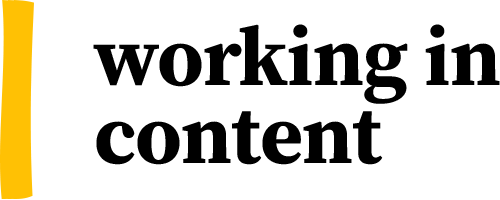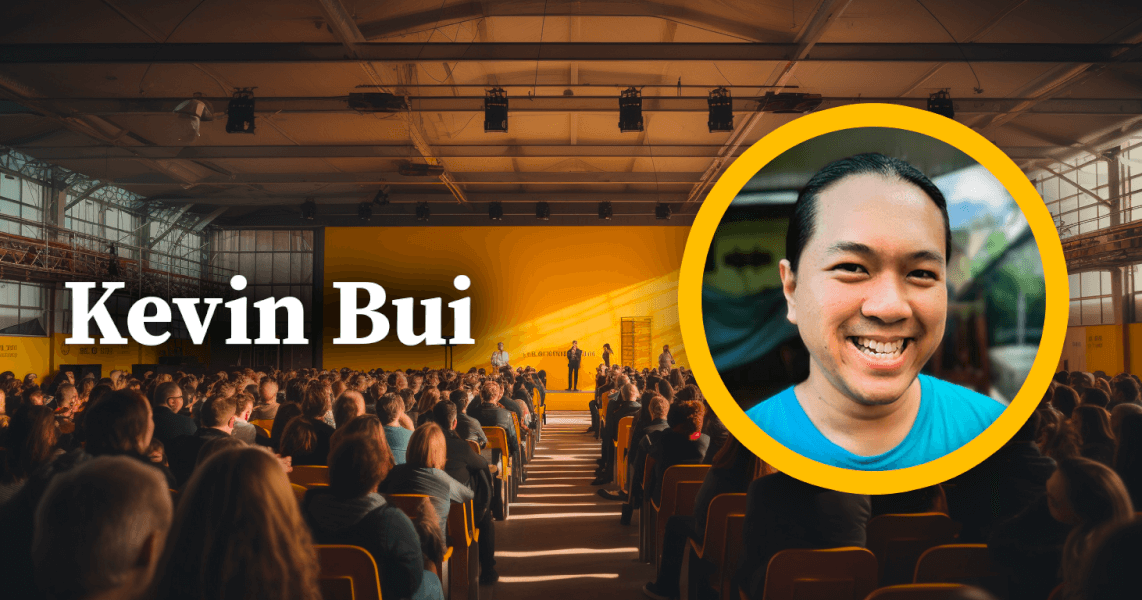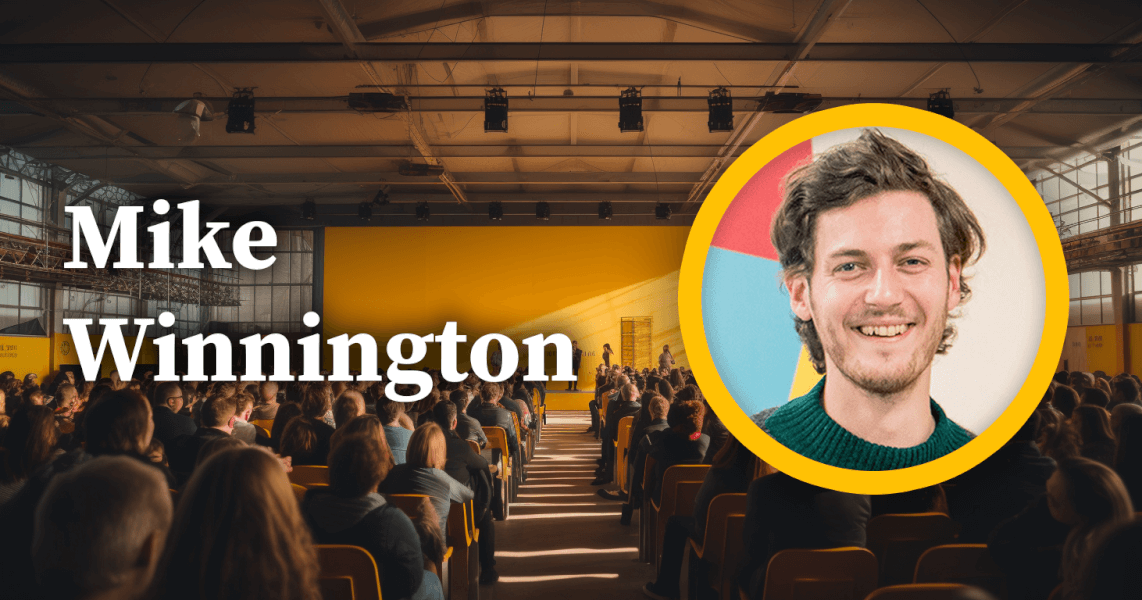In the tenth video of our Perspectives series, we present Jeneba Wint, a seasoned expert in UX and product management. Jeneba introduces a novel approach to career development, drawing parallels between the concept of MVP in product management and personal career growth. Her presentation is a must-watch for professionals looking to innovate in their career trajectory.
Meet our speaker
Jeneba Wint is a creative technologist with over six years of experience leading SaaS digital product development projects and over 10 years in the tech industry, specifically in the digital content management and operations space.
She enjoys speaking on digital transformation (systems and tech stacks), the future of work, and career development, and career branding for Black technologists. Her secret sauce is in digital product development and digital program operations! Standing up new programs, processes, and technology keeps her up and night and gets her excited for work in the morning. She thrives in bringing order to chaos. As a strategist at heart and a natural problem solver, the intersection of systems and strategy is her jam!

About this talk
In her presentation, Jeneba Wint delves into the concept of treating one's career as a Minimum Viable Product (MVP). She draws on examples from the tech world, including the early iterations of successful companies like Airbnb and Groupon, to illustrate the power of starting small, learning from experiences, and iterating towards success.
Jeneba's talk is not just about career strategies; it's a blueprint for continuous personal evolution. She shares six key strategies that have helped her 10x her success, emphasizing the importance of finding one's niche, defining success metrics, embracing flexibility, and continuously seeking feedback.
Other videos in this series
Katrin Suetterlin explores the complexities of neurodiversity in the workplace, emphasizing the role of inclusive leadership and the need for a nuanced understanding of neurodivergent experiences.
Jen Dionisio shares her journey as a content strategist, her experiences in management and coaching, her personal growth during the pandemic, and offers insights and lessons to help others in their content strategy careers.
Kevin Bui outlines a three-step approach to navigating promotions, focusing on auditing one's skills, reflecting on past projects, and gathering valuable testimonials from colleagues.
Lessons learned from Jeneba
Embracing the MVP Concept for Career Growth
Jeneba Wint advocates for applying the Minimum Viable Product approach to career development. She suggests starting with a basic version of your professional skillset and objectives, then incrementally improving and expanding them based on real-world experiences and feedback. This approach encourages continuous growth and adaptation, allowing professionals to remain agile and responsive to the changing demands of the job market. Jeneba emphasizes the importance of being open to learning and evolving, akin to how successful products are developed and refined over time.
Defining Success Metrics in Your Career
In her presentation, Jeneba underscores the significance of setting clear, measurable goals for your career, similar to how success metrics are defined in product development. She encourages professionals to identify and focus on key performance indicators (KPIs) that align with their career aspirations and values. By doing so, individuals can track their progress more effectively and make informed decisions about their career path. Jeneba's emphasis on this strategy highlights how a structured, goal-oriented approach can lead to more satisfying and successful career outcomes.
The Importance of Flexibility and Continuous Learning
A central theme of Jeneba's talk is the importance of flexibility and a mindset geared towards continuous learning. She advocates for embracing change and being willing to pivot when necessary, drawing parallels to how products might need to adapt in a dynamic market. Jeneba illustrates this through her own career, discussing how she navigated various roles and challenges by staying flexible and open to new opportunities. This lesson is particularly pertinent in today's fast-paced work environment, where the ability to learn from experiences, both positive and negative, and adapt accordingly is crucial for long-term success.
About Perspectives Conf
This talk is part of Track #2 - Growing into a senior content role of the 2022 edition of our conference.
Perspectives Conf is the world’s first event specifically focused on the careers side of content. It’s been carefully curated to help people at all levels navigate the many facets of working in content – from being the first content person to hiring and growing a team.

Transcript of the talk
00:01 Hi, my name is Jeneba Wint. And today my talk is called You are the real MVP, How to apply the MVP concept to treat your career like a product.
00:13 Now, many of us have heard of the MVP concept, but you might not have heard how to apply the MVP concept to your career.
00:21 And that is what we're going to walk through today. This is MVP me, beta me. This is where it all started before the iterations.
00:35 I've always been a person to constantly pivot and change and have options throughout my career. I've always treated my career like a minimal viable product.
00:47 Over the last nine years, I have changed job titles six times and continue to continue to evolve my career and what it is that I'm doing in the discipline of UX and product management.
01:06 So this is the MVP of air, and this is the MVP of AirBnb. This is how it all started. Many of you may not have known that they started with this simple website and the founders rented out their San Francisco apartment to people who were conference goers, who could not afford hotel rooms.
01:27 That was the problem that they were trying to solve.
01:35 This is how it's going 2022 AirBnb. If you know, and you use AirBnb, you probably love it because the UX and the UI is amazing.
01:46 This is where they ended up, but not without challenges, failures along the way. Many of them, This is what it took to get to the AirBnb.
01:59 We know today, This is the GROUPONMVP. This is where they started. Many of you might not know. They started with a simple WordPress website And they used to email PDF vouchers to their subscribers of the daily deals.
02:16 They just posted the daily deals. When you bought one, you clicked on one of these buttons. They would send you a PDF voucher.
02:26 Very simple. Again, this is where it started. They had to start somewhere and then iterate from there to get to what it is that they had in the end, the final product.
02:40 Now, this is how we apply the MVP concept to a career. We all know who this is. This is the MVP of Rihanna.
02:53 So this is where Riri all started. We know that in 2005, she started as a singer and entertainer throughout the year.
03:01 She's evolved her career, iterated her career. She has done acting singing. She is now in 2021, the proven concept
03:14 By 2021, she has gotten to be a billionaire. She is a beauty and fashion, mogul and entrepreneur, But she has to go through so many stages.
03:25 So much failure. Try iterate, experiment, collect feedback, revise, and attempt again, To get to where she is today. So what is an MVP?
03:44 An MVP is a minimum viable product that represents the, at least the least amount of work or effort needed to create or develop something using experiments and feedback.
03:55 That's the definition from Eric Ries, the author of The Lean StartUp. Now as applied to careers, I want you to think about how that would apply to your career.
04:10 So when we're thinking of getting to the next stage or the next level, or the next role in a content strategy, content design career, what is the least amount of effort needed to make that leap to go from junior to senior, to go from managing, being an individual contributor, to managing a team?
04:37 What are the small things that you need to do and small efforts that you need to do or create or develop in order to make those leaps using experiments and feedback.
04:50 Remember, you are the real MVP. You are the most valuable product ever the product of you.
04:58 So now we're going to talk about six strategies that I've used to apply the MVP product to my career, 10 X, my success adopt the MVP concept and mindset.
05:11 Typically we use these strategies in the tech world to build products, but they could just as easily be used in our careers.
05:23 One find your secret sauce. Your secret sauce is your niche. It's a defined set of skills that you use that make up your secret sauce.
05:33 That help you provide value continuously and consistently,
05:39 Um, developing high value, impactful tasks. So I know a lot of times when we might be in junior roles, or even in any role at the senior or executive level, there are tasks that we have to do that are, we may consider a below our skillset, or we may consider busy work, but I want to encourage you to
06:02 focus your day and your weeks, your work weeks on doing high value tasks, high value tasks that help you deliver more value and then make a bigger impact and a broader impact and increase your visibility.
06:18 This is how you build trust in your work and continuously and consistently provide value. Um, find a way to differentiate yourself in the tech world and their product world.
06:30 We call this an unfair advantage, but it's really a talent or a skill when applied to your career, that positions you as a thought leader in your particular discipline
06:42 Two define your success metrics. Um, success really is a journey. Um, Rihanna said it best when she said that success for her is a destination.
06:55 It's not a destination, it's actually a journey. So what can you do to define your journey and establish metrics that help you measure track, um, observe, understand your progress, um, creating a career vision and a career strategy for yourself is one way that you can do that so that you can, um, reverse
07:21 engineer your success. And you can have steps or actions that you take along the way over the course of your career to get to that success.
07:30 Um, you can always evolve and iterate on your success metrics, the success metrics that you had for yourself as a junior in the content strategy or content design world are not going to be the success metrics that you have for yourself when you get to the next level as, as a senior or as a manager or
07:49 lead, Um, success metrics, when defined, look like, um, how much impact does the work that I'm doing have on the user, on the business, saving money, ROI, things of that nature.
08:10 Three be lean learn, fast, fail and pivot, um,
08:16 Learn to redefine failure, mistakes and missteps as learning lessons in, in doing that create alternative outcomes for yourself. So maybe you got laid off or maybe you were actually fired from a job, or you didn't get the performance review that you thought you were going to get reframe that as this
08:38 is an opportunity for me to go into an even better opportunity. This is an opportunity for the right role to come along for me
08:48 In which I can grow and provide more value, empower yourself when you get new opportunities for greater responsibilities in your role, or you even get a new role or a new job offer, celebrate that win as a learning experience or a notch in your career path or career strategy that you have set up for
09:13 yourself and test unknown possibilities. This can look like applying for a stretch role. This can look like taking a role when you're not ready.
09:26 This can also look like raising your hand for high visibility, high impact projects and opportunities within your current role, which is also a way to test and experiment and 10, 10 X your career success
09:43 Four be flexible on your career goals. Long gone are the days of the rigid career plan in which you only follow the career path that a manager or Google or the company has laid out for you create alternative paths and ways to get to your end goal or your north star in your career, the success that you
10:08 desire for yourself in your career. There are so many ways to get to that goal or achieve that goal. You don't have to follow a straight path.
10:18 A career is never going to be a straight path, um, remember to make incremental steps in, in your career so that your goals don't seem so big.
10:32 Break them down into smaller sub goals for your career. Um, get to where you're going in smaller steps and in smaller stages, you do not have to rush career success or achieving career goals.
10:45 There's no manual that says that you have to take 10 years, five years, three years. Um, but in making small steps toward your end goal or towards what you have built out for yourself in your career plan, document them, you can definitely achieve them faster, Fall in love with your craft and not your
11:10 career path. I love this quote and feel free to tweet it out.
11:17 Falling in love with your craft is so important because career paths, as we said, can change and mastering a set of skills.
11:28 Understanding your zone of genius, mastering your unique value Definitely is more important than being in love with a career path, being in love with the skills, the skillset, your niche, your secret sauce definitely helps you catapult yourself from one role to another, from one company to another, from
11:53 one opportunity to another, because you know what you can do, what, how you consistently and continuously provide value. And that never changes that never gets old, that never gets stale.
12:08 Five consistently seek feedback on your work feedback. Combined with metrics is such a powerful combination when building products or in the tech world and the same applies to our careers.
12:24 So we understand how we're performing. We understand how we're performing over time, and we understand the value we're providing and how that impacts a company.
12:40 So combine that with feedback, and it's such a powerful thing, um, by consistently seeking feedback on your work, it helps to guide you, and it helps you to understand and refine your skillset, uses feedback to support your secret sauce.
12:59 So you can understand where the gaps are in your skillset. You can refine them, you can get better at your skillset.
13:09 You can improve your skillset. You can get new skills and master them as well. Um, I like to keep a performance portfolio of my secret sauce of my zone genius of my personal value proposition and how I apply that to every role and what this looks like is I keep a career journal and I keep a folder, either
13:34 an Outlook or Gmail that helps me to, um, save and track kudos, wins, um, constructive critique. And I review those so that I understand how I'm doing.
13:49 I understand the value I'm providing, where I'm filling gaps in the company where I have gaps in my own performance.
13:57 And that just helps me to get better and communicate my value to leadership a lot better.
14:09 You can't improve what you don't measure. This is an amazing tweet that I found from the good folks at single mind on Twitter.
14:19 And you have to be able to measure to improve. You don't know what you don't know. And so in, in measuring your performance, tracking your performance, it helps you to improve it because you know where you have gaps, you know, where you're killing it and crushing it, and you know, where you need to improve
14:38 and get better. And you know what, um, those observing you are saying about you and your performance six, treat yourself like a working work in progress, take a deep breath, and don't be so hard on yourself.
14:55 Um, run your career. Like it's a marathon made up of several sprints in which you can sprint and you can jog.
15:06 It's a marathon. You don't always have to go fast and step on the gas, but you don't always have to go slow and reflect.
15:14 Um, I think it's made up of periods of both, Both all running towards your success, Treat your career like a series of experiments as you would a product.
15:27 Those of us, um, working in the tech world and, and currently working in our content. Um, careers know this as AB testing, feel free to treat your career the same way.
15:39 Um, you can test different roles. You can shadow other people. You can test out different things in other careers, take on new projects
15:50 And test out your skillset there, figure out what you don't like and what you do like, and continue to refine from there Always be in a continuous state of improvement, pursuit and mastery.
16:04 And that is really what the MVP concept and mindset is all about. Continuous improvement in small increments to achieve success.
16:19 MVP concept is more than a concept. The MVP concept is a mindset. It says, think big for the small term, but small for the short term, a quote from SyncDev.
16:32 How that's applied to your career is you take the big goals and you break them down into small goals, and you do those incrementally.
16:40 You refine, you measure, you collect feedback And you do it again. And that helps you to get to your long-term goals in your career goals and also 10 X yourself to success.
16:56 So we've seen what the MVP looks like into products. We've seen the MVP of Groupon. We've seen the MVP of AirBnb.
17:05 We've seen the MVP in a career with Rhianna's career, And we know that it's made up of continuous improvement, setting goals, creating a plan, collecting feedback, measuring and improving, All made up of a secret sauce and your skillset.
17:31 So now that you have the ingredients and you know what the MVP concept is, you can go out and be the real MVP.
17:42 You are the real MVP, the MVP of you. You can find me on social on Twitter. You can find me at jenebamwint on LinkedIn.
17:54 You can find me at Jeneba Wint. You can also email mejenebawintatgmailcom. jenebawint atgmailcom. Feel free to contact me and reach out.
18:04 Thank you so much for having me.
Want to know when the next video from Perspectives Conf is published on our website? Sign up for our weekly newsletter in the box below to get notified.



















